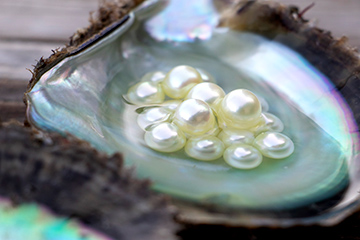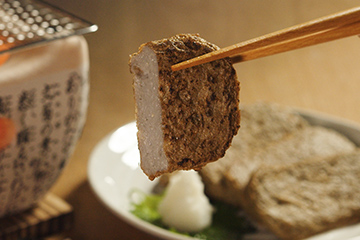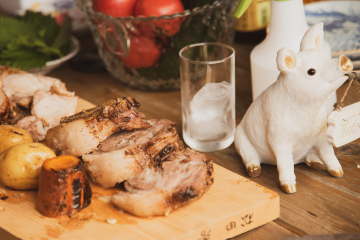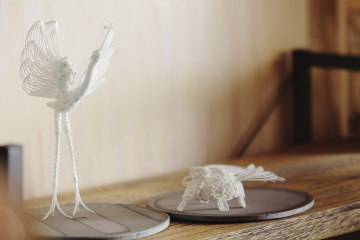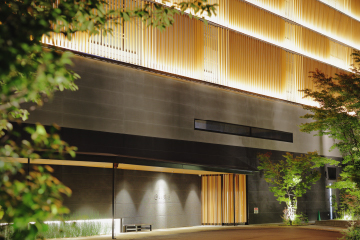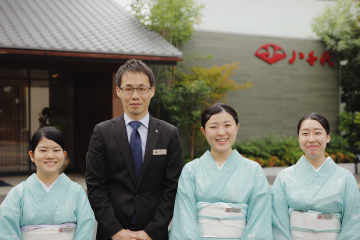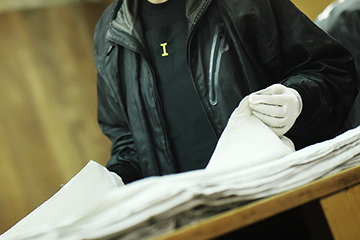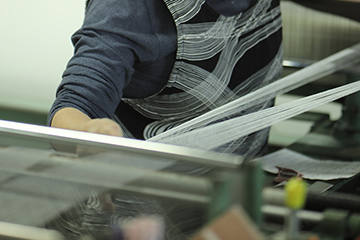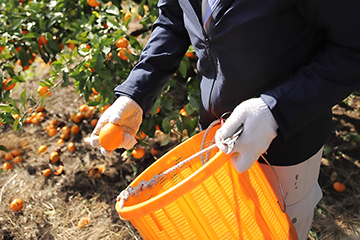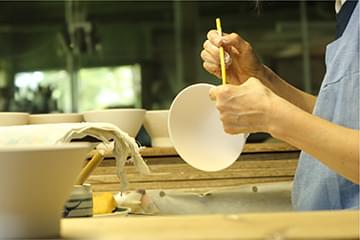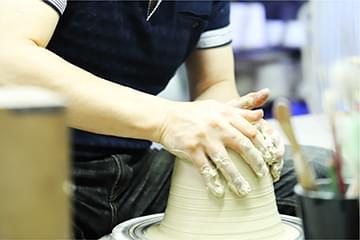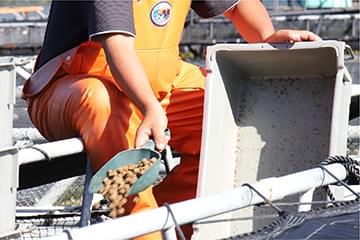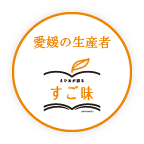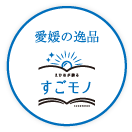Resilient Strength within Soft and Fluffy Comfort—The History and Appeal of Towel made in Imabari Vol.2 Tango
“More than 30 years ago, during our childhood, Imabari was very prosperous and the local shopping districts were full of people,”
explained Mr. Hirofumi Tango, the president of towel manufacturer Tango, which makes products popular among women. Imabari City developed historically with the towel and shipbuilding industries. More than 500 towel producers once existed. Director Kayo Tango said that there was a yarn twisting factory in front of her house from her earliest memories, and she used to see workers there all the time. “A day at the factory began at around 5 am. I still remember the sound of the machines.” Later, they both briefly left Imabari when they went to universities, but returned there and now engage in towel production. Their history is full of passionate gratitude to those who took care of them.

Starting with a Desire to “Give Back to the Locals”
Mr. and Mrs. Tango were born and raised in Imabari. After graduating from high school, they both went to universities outside the prefecture.
Hirofumi: I was planning to get a job outside the prefecture. But my father fell ill when I was a college senior. So I returned to Imabari after graduation and took over my father’s insurance company.
Kayo: After graduating from university, I became a school teacher in Hyogo Prefecture, where the local people helped me a lot. People brought me dishes and vegetables. That was where I learned to live with a community.
When you two returned to Imabari, the towel industry there was stagnant due to cheaper imported towels. While Mr. Tango’s insurance business was going well, along with a newly-started real estate business, you felt deep distress from the closures of the towel factories.
Hirofumi: Insurance and real estate are local businesses, supported by customers. Every time a local talked to me about their business closing, I was always eager to find something I could do to help. But I was irritated with myself, since all I could say at that time was, “I see, please take care of yourself.” The towel factory that we took over was a customer who did a big favor for us before—it saved us when our major client went bankrupt, causing the loss of two thirds of our sales.
Mr. Tango, you wanted to give back to the locals, so you made a proposal to the president of the closing towel factory to take over the factory.
Hirofumi: At first, I was told not to be so reckless. The factory closure was already underway, and there were no business partners or sales. However, I thought that by attracting public attention by restoring this towel factory, it might lead to an increase in the sales for the towel industry in Imabari as a whole. I thought it would repay the local community. Looking back, my idea was way too optimistic (laughs).

Realization of the Essence of “Conveying” and “Being Understood” through Participating in a Magazine-hosted Event
You two took over the towel factory in 2015. You started by visiting each craftsperson who had worked for the factory.
Hirofumi: The previous factory had a 90-year history with many highly skilled craftspeople. So I asked them to stay, and seven did. However, for about six months, we had no work to do. Everyone was just doing weeding around the factory. We also visited many clients, eagerly asking for orders.
Kayo: I developed our own brand “OLSIA,” which was named after “weaving (oru) happiness (shiawase).” We made our own towels, but didn’t know how to sell them. We thought we would just go wherever we wanted to go. So we applied for an event hosted by the magazine “VERY.” Receiving an invitation for the event made us really excited.
Hirofumi: Participating in this event was our turning point.
Kayo: I sent letters and towels to the people we met at the event. Then fashion models at the show introduced our towels on their social networking services. Gradually, our towel began to sell as a baby gift. We were so grateful.
Hirofumi: People understood my wife’s letter and discovered how comfortable the towel was. I realized that value is born only when it’s understood by people—this probably can be true of any kind of work.
Kayo: Our towels are sincerely made by craftspeople in their 70s. I was motivated by realizing that our products are so excellent in quality, and that taking over the factory is meaningless unless we properly convey the value of our products. The VERY event gave us an opportunity to realize what conveying and being understood actually mean.

The OLSIA Premium Series uses super-loose twisted threads. These threads easily break, requiring high skill for processing. “Using these threads makes for super soft and comfortable towels,” said Mr. Tango.

A veteran worker who has been involved in towel production for over 40 years. “She seems serious during work, but once her work is over, she talks with a gentle smile,” said Mrs. Tango while describing the charm of the craftspeople.

Tango does not have the latest equipment or high-speed weaving machines. However, thanks to its good old-fashioned weaving machines, soft and thin threads that would normally break can be used to slowly and gently weave towels. Each towel is made with care and love.

Consumers, Locals, and Producers—A Desire to Make Everyone Happier through Towels
Your towel production started with a desire to give back to the locals. After taking over the factory, you proceeded through trial and error, saying, “Everything is fated.”
Hirofumi: I think all jobs consist of one of two factors: increasing the amount of joy, or solving problems. Towels that are comfortable to use or that have a beautiful color increase the amount of joy. Managing to produce towels within a short delivery time is solving problems. The craftspeople have big smiles when they hear words of appreciation from our customers in person. My purpose of doing this job is to make our workers happy as well as our customers.
Kayo: After I had a baby, towels became very close to me. Babies are wrapped in towels right after birth, right? We use towels every single day. This idea made me think that towels can enrich people’s lives. As a working mom, I’d like to make women who work hard every day happier with a towel.
Hirofumi: I’d like to make our community happier as well. For many young people, once they’ve left Ehime or Imabari they rarely come back. If new value is created here, young people may come back, I think.
Kayo: The craftspeople were thrilled when a magazine featured Tango towels, saying, “We didn’t realize our towels are so good.” When I ask their advice about products from the consumer’s perspective, they give me positive comments like: “it may be possible by doing it this way” or “this method may be better.” We are truly happy to have such workers. I believe every community—not only Imabari—has various skills, industries and people that are working hard like this. I hope that those people receive more attention.

Tango has been focusing on training young people for the past two years. “But the skills of our craftspeople are too sophisticated to proceduralize,” says Mr. Tango. In pursuit of ideas for passing down skills, he visits work sites in other industries, such as concrete product manufacturers.
Taking over a towel factory with 90 years of history, Mr. and Mrs. Tango are creating new history together with their craftspeople. “We do everything through trial and error,” they say. They will surely continue to pave the way in a unique Tango-like manner by being considerate to people, that will bring happiness to many people through towels. Why don’t you give the gift of a towel—carefully and wholeheartedly produced by skilled craftspeople—to a loved one or yourself who works hard every day?
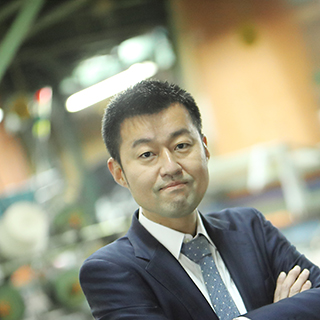

TEL: +81-898-55-8857
https://www.tango-imabari.jp/
https://www.facebook.com/tangoimabari/
https://www.instagram.com/olsia__towel/?hl=ja






